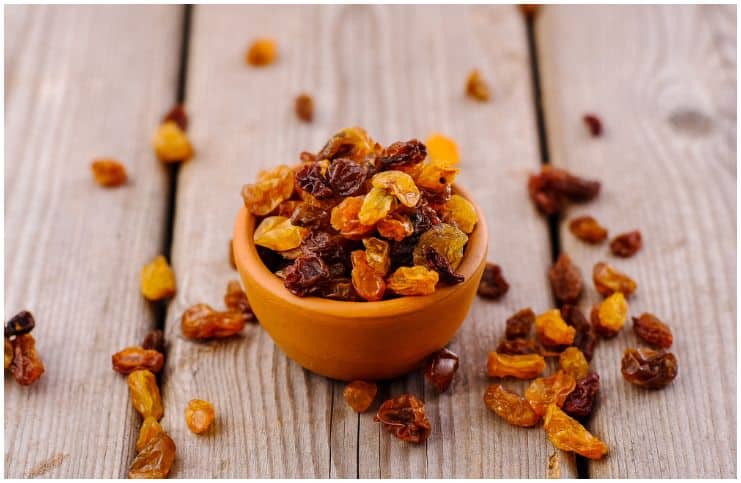Currants
They are native to central and northern Siberia and Europe (France, Belgium, Sweden, Norway, the Netherlands, Germany, Spain, Italy, Poland, and Portugal), and they grow fast as small deciduous shrubs attaining a height of about 6 ft.
European and Chinese folk medicine both claim numerous traditional uses for this fruit as a curative.
Nutrition Facts
They have a high concentration of polyphenolic substances, anthocyanins, vitamin C, antioxidants, gamma-linolenic acid, vitamin B1, vitamin B2, vitamin B3, vitamin B6, copper, iron, magnesium, calcium, manganese, potassium, dietary fiber, and phosphorus.
Health Benefits
Boosts The Immune System
They are a good source of vitamin C, that strengthens the immune system, nourishing it to prevent the human body from succumbing to bacterial and viral attacks. Moreover, this vitamin helps to decrease total and LDL cholesterol, protect against heart disease, prevent scurvy, regenerate and repair tissues, as well as it aids in the absorption of iron.
100g contains 4,7mg of vitamin C that is 5% of the daily recommended intake.
Copper
Copper is an essential mineral to inhibit free radical compounds from damaging DNA and cellular tissue and for energy metabolism. Also, this trace mineral is used by the human body to promote the absorption of iron and to synthesize collagen (the most predominant protein in the body).
Additionally, copper has potent anti-inflammatory properties which help to relieve stiffness and pain linked with arthritis.
100g contains 0,5 mg of copper which is approximately 52 percent of the daily recommended intake.
Iron
It is a mineral crucial for the human body since it allows the organs and cells to get the much-needed oxygen as well as it helps the body to store energy for survival.
According to the WHO, a deficiency in iron during pregnancy can increase the chance of premature birth, infant and maternal mortality, and low birthweight. Also, children with iron deficiency anemia tend to become restless, irritable, and lack concentration power.
One serving of these fruits has approximately 3 mg of iron that is about 18 percent of the daily recommended intake.
Potassium
Potassium is a mineral needed for smooth muscle contraction, therefore, it is crucial for good muscle function and healthy digestion. Potassium is also an electrolyte responsible for keeping the acid-base balance in check and regulating the heart’s electrical activity.
According to research, a regular diet high in potassium lowers blood pressure. Signs and symptoms of a potassium deficiency include – muscle aches, muscle weakness, and muscle cramps.
100g contains 892 mg of potassium that is 19% of the daily recommended intake.
Side Effects
There are no scientifically proven side effects.
Raisins
They are dried grapes. The drying process actually reduces the moisture content of grapes from approximately 80 percent to 15 percent. There are numerous ways of drying grapes, like – a mechanical dehydration or sun-drying technique.
Nutrition Facts
These dried fruits are rich in vitamin B1, manganese, vitamin B6, folate, dietary fiber, protein, vitamin B3, pantothenic acid, potassium, vitamin C, copper, vitamin K, calcium, iron, selenium, and phosphorus.
Health Benefits
Antioxidant properties
They have high levels of catechins, polyphenolic antioxidants found in the blood. Antioxidants scavenge the free radicals floating in the human body which may cause damage to cells and organ systems.
A free radical is actually any chemical species that is capable of independent existence, and that contains one or more unpaired electrons. Source of free radicals include – tobacco smoke, alcohol, sun radiation, and household chemicals.
Good Source Of B6
Vitamin B6 is an essential nutrient that helps in the production of the chemicals which allow nerve and brain cells to communicate with one another. This ensures that metabolic processes, like – protein and fat metabolism, work correctly.
Symptoms of a deficiency of vitamin B6 include – worsening symptoms of anemia and PMS, fatigue, muscle pains, confusion, depression, anxiety, and irritability.
100g contains 0,1mg of vitamin B6 that is 13 percent of the daily recommended intake.
Antimicrobial Properties
Phytochemicals present in these dried fruits, including linoleic acid, oleanolic acid, and linolenic acid, fight the harmful bacteria in the mouth, therefore, preventing cavities.
Constipation
It is mentally and physically troublesome for numerous individuals (especially those following a diet low in fiber), and can greatly interfere with their daily well-being and living.
These wonderful fruits contain both insoluble and soluble fiber, reducing constipation but discouraging loose stools.
100g contains 3,7g of dietary fiber which is about 10 percent of the daily recommended intake.
Side Effects
There are no scientifically proven side effects.
Currants vs Raisins – Which Have A Better Nutritional Profile?
Both fruits are healthy and nutritious and should be included in your regular diet. However, currants have a superior nutritional profile due to their considerably higher content of iron, phosphorus, potassium, calcium, vitamin A (in the form of carotenoids), vitamin C, folate, vitamin B6, copper, and manganese.
Images credit – Shutterstock
READ THIS NEXT: Figs vs Dates – Health Benefits
